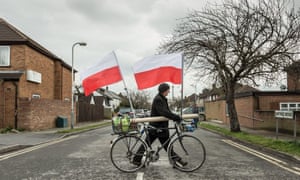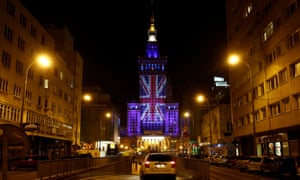Polish people in Britain and back home tell of uncertainty amid reports of xenophobia and UK’s refusal to offer any guarantees
Marcin Skierniewski has lived in London for four years, working as a builder to save enough to put some money down on a flat. That is no easy thing in the capital, but his goal was at least on the horizon when he took a holiday in Poland, with Britain yet to vote on its EU membership. While he was away, his adoptive home turned itself inside out.
Waiting at at Warsaw airport, he was preparing to return to Britain, uncertain what exactly that would entail. It was not the reports of anti-Polish xenophobia that unsettled him. “I’m absolutely not worried,” he said. “I have plenty of British friends who will stand by me. I’m not afraid.”
It was the cloud of doubt around his life plans that fuelled his anxiety. “I’m worried how it might affect me. I don’t know what happens about my idea of getting a flat now,” said Skierniewski.
The uncertainty is understandable and deliberately created: the British government is refusing to guarantee the full residency rights of EU nationals who have established lives in the UK without a reciprocal deal for Britons living in other EU countries.
Uncertainty will continue to dog the UK’s nearly 3 million European residents for some time to come. More than 850,000 of those total are Polish, but many are reconsidering their options and not just because of Brexit uncertainty and the impact on the value of earning in pounds.
Paulina, who requested her surname not be used, works at an art gallery in London. She said she thought the threat of xenophobic attacks had been exaggerated in the press. But she thought Britain’s Polish population would begin to shrink.
“Many of them are going to go back anyway,” she said. “The Polish government has introduced a £100 child benefit scheme regardless of earnings to get people to stay ... And life in Britain is tough. There is overpopulation. Train tickets are really expensive which makes it all much harder. Social mobility is not great. State education is not great. I don’t think a lot of people will stay. They might decide to go elsewhere.”
The far-reaching implications of the UK vote do not just affect ordinary Europeans who happen to have made a home in Britain.
A group of old school friends, all aged 32, were out for a drink in Warsaw’s Poznańska street, under the tall silhouette of the city’s defining monument, the communist-era Palace of Culture and Science. Their first reaction on being asked about Brexit was to shrug it off as someone else’s problem, but on second thoughts it disturbed them.
Krzysztof Paciorkowski, a vegetable trader, had seen the stories about anti-Polish incidents. “The Brits don’t like us much it seems, which makes no sense. Poles work hard, they work professionally and pay taxes,” he said. “I also think it was pretty strange when the Brits started asking Google what the EU is, the day after they voted in the referendum.”
Paweł Kurach, an apple farmer with orchards 25 miles (40km) outside Warsaw, had two concerns. His brother’s family had been in London for 10 years –he was worried about their future and what would happen regarding his brother’s longstanding job as a restaurant manager. The second worry was contagion.
“What I worry about is whether Poland is going to be next,” Kurach said. “I worry it’s going to be like dominoes and the question is, where does it end?”
Poland’s rightwing nationalists are already in power in Warsaw. The Law and Justice party (PiS) has drawn expressions of concern from Brussels and Washington over the independence of the country’s constitutional court. It has purged the state media of leftwingers and centrists, and has overseen the rise of anti-immigrant sentiment.
Many of the comments underneath recent online reports of anti-Polish incidents in the UK, observed that it was no more or less than what was happening in Poland.
The prime minister, Beata Szydło, seized on the UK’s vote to leave as a symptom of Europe’s ills, and argued it justified a new European treaty that would repatriate powers from Brussels and therefore be more responsive to ordinary people.
“Poland is active and wants to be active in the process of change which must come to the European Union, because Brexit shows first and foremost that Europeans no longer want a union of its form up to now,” Szydło said.
The centrist and pro-European opposition has argued that British withdrawal increased the need for greater European solidarity and integration. Bogdan Klich, a former defence minister and now a leading opposition senator, said: “The UK vote will mean a visible shadow on Polish-British relations though it will not happen immediately but over a long period.
“We are concerned in such a context about the future of the European Union. We are aware the EU will not play such an influential role on the international stage as it played before.”



No comments:
Post a Comment